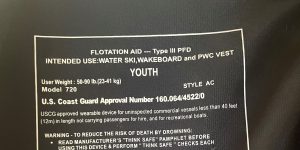This week is the National Safe Boating Week (May 21-27). This event is part of a boating safety campaign led by the National Recreational Boating Safety Program. Since its creation in 1971 by the United States Congress, through education, this program has helped reduce the number of boating casualties (the sum of deaths and injuries) by more than 50%. However, there is still work to do; one fatality is too many.
In Florida, in 2020, according to Florida Boating Accident Statistical Report by the Florida Fish and Wildlife Conservation Commission, 70 people lost their lives in boating accidents, and Florida was the state with the highest number of fatalities; the second was Texas with 55, followed by California with 33.
According to 2020 U.S. Coast Guard Statistics, drowning was the reported cause of death in 75% percent of all boating fatalities. Of those victims, 86% percent were not wearing their life jackets, and two-thirds of drowning victims were considered good swimmers.
Therefore, ONE THING that all boaters can do to prevent fatalities is to wear their life jackets since accidents can happen at any moment. But just wearing a life jacket is not enough; you

need to wear the right life jacket. And for that, you need to follow these simple steps:
1) Be sure the life jacket is U.S. Coast Guard-approved. All life jackets that have been approved by the U.S. Coast Guard will indicate that in the label printed on the inside of the life jacket.
2) You should wear the right life jacket for the right activity. There are life jackets for standup paddlers with belt-pack inflatable, or life jackets for anglers and open motor boats with suspender inflatable, or personal water crafts and water sports life jackets that are inherently buoyant, or life jacket designed especially for children, and even life jackets for pets.

3) Life jackets should fit just right. You do not want your life jacket too large or too small.
4) Your life jacket should be in good condition. Life jackets with a tear, broken pieces, or buoyancy loss should be disposed and replaced. Life jackets do not have expiration date; but their condition will depend on how good their owners take care of them.
Other resources:
For more information about boating accidents statistics in Florida, please follow this link: https://myfwc.com/boating/safety-education/accidents/
For more information about how to care for your life jacket, please follow this link: https://www.boatus.org/life-jackets/care/
For more information about how to read your life jacket label, please follow this link: https://safeboatingcampaign.com/news/new-life-jacket-labels/
Happy national safe boating week, wear your life jacket, and see you in the water.
 0
0
